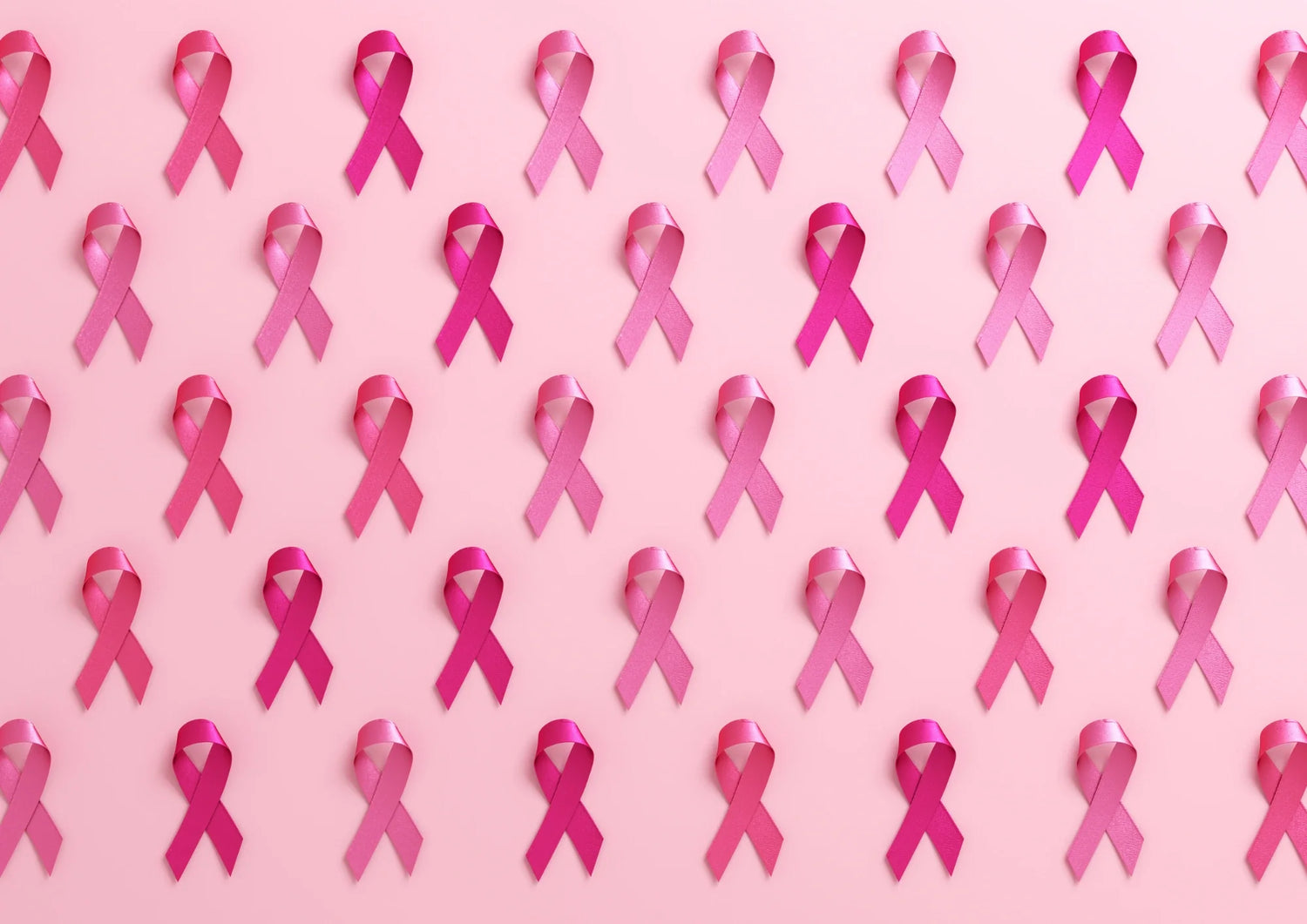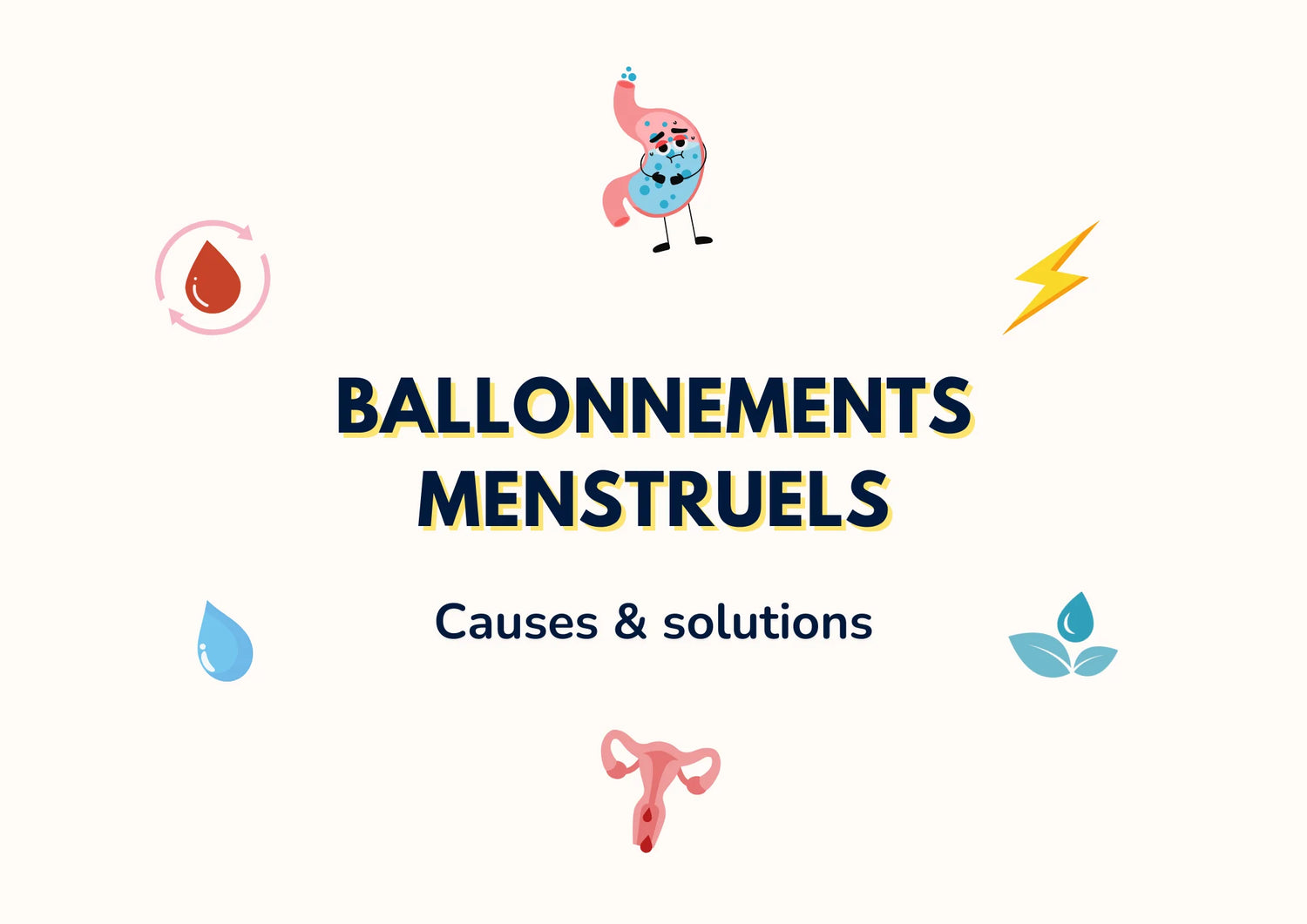You may have noticed that your belly swells before or during your period? Bloating, hard belly, discomfort—this is a sensation many women experience. This phenomenon is mainly linked to your hormones. As a result, you feel heavy and bloated.
The good news? This bloating is only temporary, and a few simple actions are enough to relieve it and restore your comfort. 🌸
Why does my belly swell?
Your belly doesn’t swell without reason during your period. Everything happens inside your body, especially with your hormones.
They fluctuate throughout the cycle and directly influence your digestion, your bowel movements and even how your body retains water.
Let’s explore together how these fluctuations disrupt your body.
Hormonal fluctuations
Having a bloated belly during your period is a common and normal phenomenon. It is mainly explained by the hormonal variations that mark your cycle and impact your digestion. 🤗
The increase in progesterone after ovulation slows down intestinal transit : your intestines become lazier, food stagnates and ferments, producing gas. Result: the sensation of a bloated and hard belly.
On the other hand, estrogen promotes water retention, responsible for this abdominal swelling. You may even notice a temporary weight gain of one or two kilos, which has nothing to do with fat but only with stored water.

👉 This water is mainly retained in tissues, especially in the abdomen, but sometimes also in the legs or breasts, which explains this general feeling of swelling.
The role of the digestive system
Your digestive system as a whole feels the impact of hormones.
- The stomach, a bit sluggish at this time, digests less well and can cause reflux or indigestion sensations.
- The small intestine, meanwhile, becomes capricious: it changes its secretions and contractions, which explains that slight discomfort after meals. 😐
- The colon is no exception and often alternates between constipation and diarrhea, depending on the time.
And to top it all off, your digestive nerves are more sensitive than usual, which amplifies the perception of abdominal pain. ⚡️
Prostaglandins and contractions
Added to this are the prostaglandins, hormones secreted during menstruation.
They have an essential role: to cause uterine contractions to expel the endometrium.
But they don’t stop there: they also disturb your intestines.
This explains episodes of diarrhea and sometimes nausea or constipation.
. In short, your belly swells because it receives a cocktail of hormones that disrupt its calm. It can be uncomfortable sometimes, but rest assured: this phenomenon is completely normal, it affects most women and disappears a few days after your period when your hormones stabilize. 🌸
PMS and bloated belly: the duo we'd rather do without!
Having a bloated belly is not limited to just the days of your period.
Many women start to feel these symptoms several days before. This is the famous premenstrual syndrome (PMS), which can appear 5 to 7 days before menstruation, sometimes even earlier.
During this period, your hormones already begin to drop and that is enough to trigger bloating, water retention, and digestive discomfort.
Some women see their belly swell very noticeably, sometimes to the point of resembling pregnancy, but that is not the case. Then this swelling can continue after your period, because it sometimes takes one or two days for your body to regain hormonal balance.
In short, PMS explains why you might feel like you have a bloated belly for almost two weeks a month. It’s frustrating but totally normal. 🤗
Now that we’ve covered the physiological causes, let’s look at a particular case where bloating can be even more intense: endometriosis and endo belly.
Endo belly: why does endometriosis cause belly swelling?
We know that having a bloated belly during your period is uncomfortable. But for some women, this phenomenon is even more pronounced and can become very difficult to live with: this is called endo belly.
Unlike simple period-related bloating, this phenomenon is much more specific: it only concerns women with endometriosis and is distinguished by its intensity and pain. This direct link with endometriosis helps to understand why it deserves special attention. 🙂
But why does this happen? Endometriosis causes chronic inflammation in the pelvic area. Adhesions, lesions, or cysts related to the disease disrupt intestinal transit.
Result: constipation, gas, abdominal pain, and extreme bloating.
It’s not just uncomfortable, it’s also physically painful and psychologically hard to endure.
If you notice intense, lasting, or disabling swelling, know that this is not normal. In this case, it is essential to consult a doctor to check if it is endometriosis or another condition such as irritable bowel syndrome (a chronic digestive disorder causing abdominal pain, bloating, and alternating constipation and diarrhea).
These situations usually require appropriate medical care, often including medication to relieve symptoms and improve your quality of life.
But rest assured: even without endometriosis, period-related bloating is common. The good news is that there are simple and natural solutions to ease these symptoms, especially the most common ones. 🤗
How to naturally reduce bloating?
Fortunately, there are different ways to calm discomfort and ease the feeling of a bloated belly, mainly through your lifestyle habits!
Diet 🥗
Diet plays a central role in digestive comfort.
For example: By limiting salt, you reduce water retention.
By avoiding cabbage, lentils, or carbonated drinks (foods that ferment a lot), you decrease gas production.
Conversely, focusing on gentle fibers (found in fruits, cooked vegetables, or whole grains) helps smoother digestion.
Finally, healthy fats rich in omega-3, found in olive oil, avocados, or fatty fish, help reduce inflammation and support your hormonal balance. 💪

Hydration 💧
Hydration also plays a key role. Even if it seems counterintuitive, drinking water actually helps limit water retention.
Ideally, aim for 1.5 to 2 liters per day.
You can vary your water intake with herbal teas made from fennel, chamomile, or peppermint. They are particularly effective to soothe bloating and relax the digestive system.
Conversely, coffee, alcohol, and fizzy sodas tend to increase discomfort: it’s better to consume them in moderation during this time. 🤗

Physical activity 🏃♀️
Moving regularly is another key.
No need for intense sport: a simple walk, some yoga poses, or a Pilates session are enough to boost circulation and stimulate your transit.
Yoga poses like cat, cow, or butterfly naturally massage your digestive organs and reduce the feeling of heaviness. 🌸
Sleep 💤
Finally, stress and lack of sleep play an important role. Yes, stress increases cortisol secretion, which disrupts your hormones and increases bloating.
A few tips can help you relieve yourself! Deep breathing exercises, a meditation session, or even a quiet reading moment can really make a difference.
Getting enough sleep is also essential: lack of sleep promotes intestinal inflammation and worsens digestive pain. 🙂
Other natural solutions 🌱
Some natural solutions can also complement your habits!
Add to your wellness routine activated charcoal. It is a valuable ally against bloating: taken as capsules or powder, it helps absorb excess gas in the intestine to reduce the feeling of a bloated belly.
It is recommended to take it occasionally, outside of meals and away from any medication, as it can reduce their effectiveness.
You can also perform belly massages with essential oils such as tarragon or Roman chamomile to relieve contraction sensations.
Finally, a hot water bottle or a relaxing bath also help relax the muscles of the uterus and intestines. And offer you a feeling of well-being coupled with a few well-deserved minutes of relaxation.
These small daily actions help restore comfort, but if that’s not enough and you suffer too much, don’t hesitate to consult your doctor, who will know how to advise you. 😊
Monitoring and medical consultation
Natural solutions can relieve, but there are situations where it is important to consult!
If your pain is very intense, if your digestive troubles persist beyond your period, or if you notice unusual symptoms (bleeding, weight loss, lasting digestive changes), it’s better to seek the advice of a healthcare professional. Sometimes, these symptoms can reveal endometriosis, fibroids, or irritable bowel syndrome. 😣
💡 Tip : to better understand your body and discuss it with your doctor, you can track your symptoms. Note in a notebook or an app the times when you feel bloated, their intensity, and duration. This tracking will help you identify your triggers, whether dietary, hormonal, or stress-related!

Bloated belly and body positivity: learning to love yourself even in these moments
Having a bloated belly during your period should never stop you from loving yourself, going out, or enjoying life! The famous “flat belly” is not a reality, but a societal injunction. In truth, even a slim woman will naturally see her belly round out one to two weeks a month, and that is totally normal. 🤗
Remember: this bloated belly does not define who you are. It is simply part of your body’s variations, which remains just as beautiful and worthy of love in all circumstances. 💙
Having a bloated belly during your period is a common phenomenon, but it should not prevent you from living your cycle serenely. 🌸 It is above all the consequence of your hormones. Between progesterone slowing digestion, estrogen promoting water retention, and prostaglandins responsible for contractions, it is normal for your belly to swell and for you to feel bloated. For some, this phenomenon can be even more marked, especially in cases of endometriosis with endo belly.
Adopting an appropriate diet, good hydration, gentle physical activity, better stress management, and natural remedies like herbal teas or a hot water bottle can really make a difference. 🌿
And if your symptoms become too intense or unusual, don’t hesitate to consult for appropriate medical support.
Remember: you are not alone. This bloated belly is not inevitable, and there are many ways to better live your period. 💖























 https://mysorio.com
https://mysorio.com


